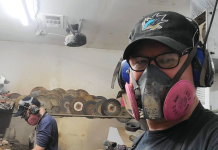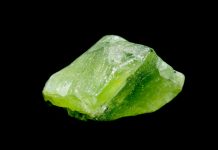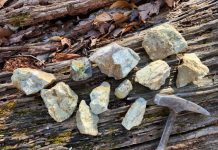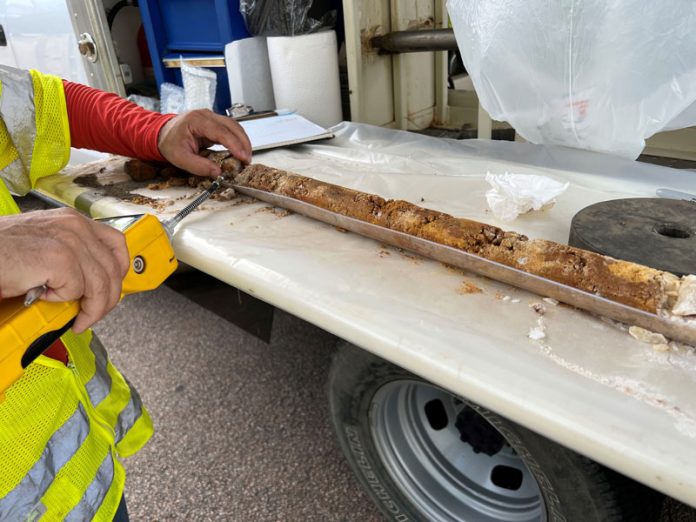
Geology careers are probably the most evident to casual observers, but there may be a geologist at work down the street or on the riverfront nearby. For example, some might assume a small vessel out in a bay is just another recreational boat or a Coast Guard vessel. In reality, it’s piloted by hydrographic surveyors taking soundings of the silty or sandy bottom, determining where the best and most stable areas are for planned dredge cuts. It also locates potential shoaling in Federal navigation channels.
Many of us have often wondered if geology careers were possible. Geology is so interesting… but could it be a career? Here are eight geology careers that can provide a good living and fulfilling work.

1. Museums
Museum jobs are increasing by an amazing 12 percent each year as projected over the years 2021-2031 by the U.S. Bureau of Labor Statistics. Most require a master’s degree and the median annual salary for a curator was $50,100 according to May 2021 data. Johns Hopkins University offers degrees in museum studies.
2. Environmental Geology Careers
Environmental geology careers are growing in prevalence in many countries. Have you ever driven past a service station where a tank was being pulled out of the ground and the tank and surrounding soils were being tested and removed/replaced as needed? Did you know a geologist put together the plan for testing the soil and groundwater and determining the best strategies for remediation? The environmental geologist career is high-paying, sometimes six figures per year.
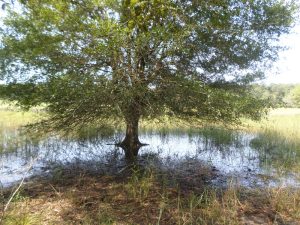
DEBORAH PAINTER PHOTO
3. Geomorphologist
Geomorphologists are in demand in government and private companies. Their work focuses on understanding how landforms change over time. They perform hydraulic, hydrologic and geomorphic analyses to map resources such as groundwater and petroleum. If you love math and geology, geomorphology could be a perfect match. The career pays well too!
4. Hydrographic Surveyors
Hydrographic surveyors use instrumentation to map out the shape, contours and depth of streams, lakes, inlets and ocean bottoms. They often work for government agencies or private companies doing surveys for the government and nonprofits. For example, ecological restoration of channelized streams requires a hydrographic surveyor to determine the best approach to restoration. The median salary is around $80,000 per year.

COLIN BEHRENS PHOTO
5. Gemologist
When we buy a diamond or any precious colored stone from a fine jeweler, a gemologist was responsible for identifying, grading and selecting it. Careers include working as a lapidarist, bench jeweler, consignment director, appraiser, jewelry litigation expert witness, a fine jewelry polisher, and a precious metal tester. A college degree in geology is not necessary to get started gem cutting. There are many gemology schools with programs and diplomas.
6. Mineralogist
Mineralogists collect core logs, conduct geochemical and geophysical surveying, create geological mapping, and examine geochemical samples like petroleum, minerals or rocks using such instruments as gas chromatographs, carbon analyzers, microscopes and spectrometers. They perform original scientific research to determine the ages and other characteristics of specific soils, minerals and rocks. They oversee processes that separate minerals from their ores. The educational requirement for most mineralogist jobs is usually a master’s degree at minimum.
7. Mud Logger
Mud loggers analyze drilling fluids after they have been drilled up. They analyze the fluids in a laboratory. Mud loggers determine the position of hydrocarbons to depth. They also monitor natural gas and identify the physical characteristics of outcrops available in a given area of study.
8. Wellsite Geologist
Wellsite geologists are the next level up from mud loggers and you must be a mud logger first. Both require a bachelor’s degree in geology. Wellsite geologists classify rock cuttings removed from wells. They use rock-cutting data, core samples and specialized tests to advise gas and oil operators on how deep to drill wells. They prepare reports during and after the drilling. This is one of the highest-paying geology jobs with salaries topping six figures per year.
Geology Careers Provide Varied Work
The pay can be good. But geology careers are not just about making money. It’s also the wide variety of work and the demand for it. The Bureau of Labor Statistics projects a 4.5 percent job growth in the geosciences, including environmental geoscientists, from 2021 to 2033, a 5 percent job growth in geoscientists, not including hydrologists, overall, and a 5.4 percent job growth increase in geoscience technicians.
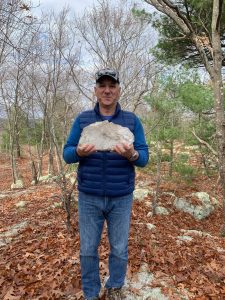
DENNIS PAPA PHOTO
Consulting Geology Careers
Dennis Papa, P.E. is a principal at dpSTU-DIO LLC, Environmental Consulting and Design with offices in Richmond, Virginia and Providence, Rhode Island.
“Back in the late 1980s (seems like the Precambrian!) many undergraduate geology programs were focused on petroleum exploration and mineral resources. That is what I was originally interested in, imagining a career looking for oil-bearing formations. When jobs in petroleum and coal exploration started to become scarce, the environmental industry was just ramping up. I was drawn to the idea of a job that offered a mix of both fieldwork (doing well installation, groundwater and soil sampling) as well as office work to write reports, use software, and engage with other experts and clients to study a contamination problem.”
Many wonder if a professional geologist license is needed. “The P.G. is simply a test that each state offers to a geologist who has the requisite degree and minimum years working in the industry. A national exam is now offered to standardize the test. but not all states require it. Many states require a P.G., or working directly under a P.G., to practice geology, but it is not a requirement for all careers in geology and is certainly not required once starting out.”
Geology Tools & More…
As with any job, sometimes the fun is in the tools used. “Tools always offer that tangible connection to your trade. The geologist hammer is indispensable. A hand lens magnifier, soil color chart, and grain size chart used to compare sorting, size, etc. of sediment and rock samples are important tools to help provide useful data in standardized terms. Aerial photographs are used. We also routinely use a water level meter to accurately measure depth to water level.”
Dennis works closely with other specialists. “We rely very heavily on experienced and licensed well drillers, geotechnical engineers, wetland scientists, soil scientists, archeologists and geophysicists.”
In Dennis’ opinion, “I am partial to the environmental consulting field because it has offered me so much. However, I think there are so many geology career paths to choose from, and there have been so many advances in the subspecialties, that it just depends on your particular interests. Some offer more time in the field, others more opportunity to work in an office or laboratory. And if you can’t decide, the beauty is that many geology jobs offer a combination of both.”
Geology Careers and Hybrid WorkYou can minimize the office grind and enjoy being in the field even if computers are a vital part of the job says Dennis Papa, professional geologist, “I was drawn to the idea of a job that offered a mix of both fieldwork (doing well installation, groundwater and soil sampling) as well as office work to write reports, use software, and engage with other experts and clients to study a contamination problem.” |
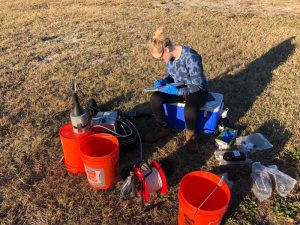
CLAIRE STARKE PHOTO
Geologist
Claire Starke is a geologist with a large consulting firm with offices around the world.“I knew I wanted to be a geologist at age seven and I chose environmental geology because I felt that it would get me further in the business world and encompass different types of jobs. I graduated in the spring of 2021 so I was going to school through a time when environmental remediation and sustainability was a large chapter covered in all my major classes.”
A typical field day for Claire includes, “I mainly work with environmental sampling in groundwater monitoring wells. I use different types of well pumps to pull the water out of the well at a low flow rate. We work with drilling companies, and they will do the physical placement, but a geologist will tell them where to put the well, how deep to drill, and how deep to place the screen of the well. I have worked with hydrologists and hydrogeologists to figure out groundwater flow. I have worked with chemists to discuss the chemicals found in groundwater samples.”
What geology fields are best? “In my opinion, environmental remediation is the best geology field for the time we are in now. There are always new chemicals being found to be dangerous to human health, someone is needed to address the issue and needed for remediation, so it’s a sustainable career because the job is never done. You get a very nice blend of field and office activities. You also get to make the world cleaner and healthier in small and big ways.”
This story about geology careers appeared in Rock & Gem magazine. Click here to subscribe. Story by Deborah Painter.



